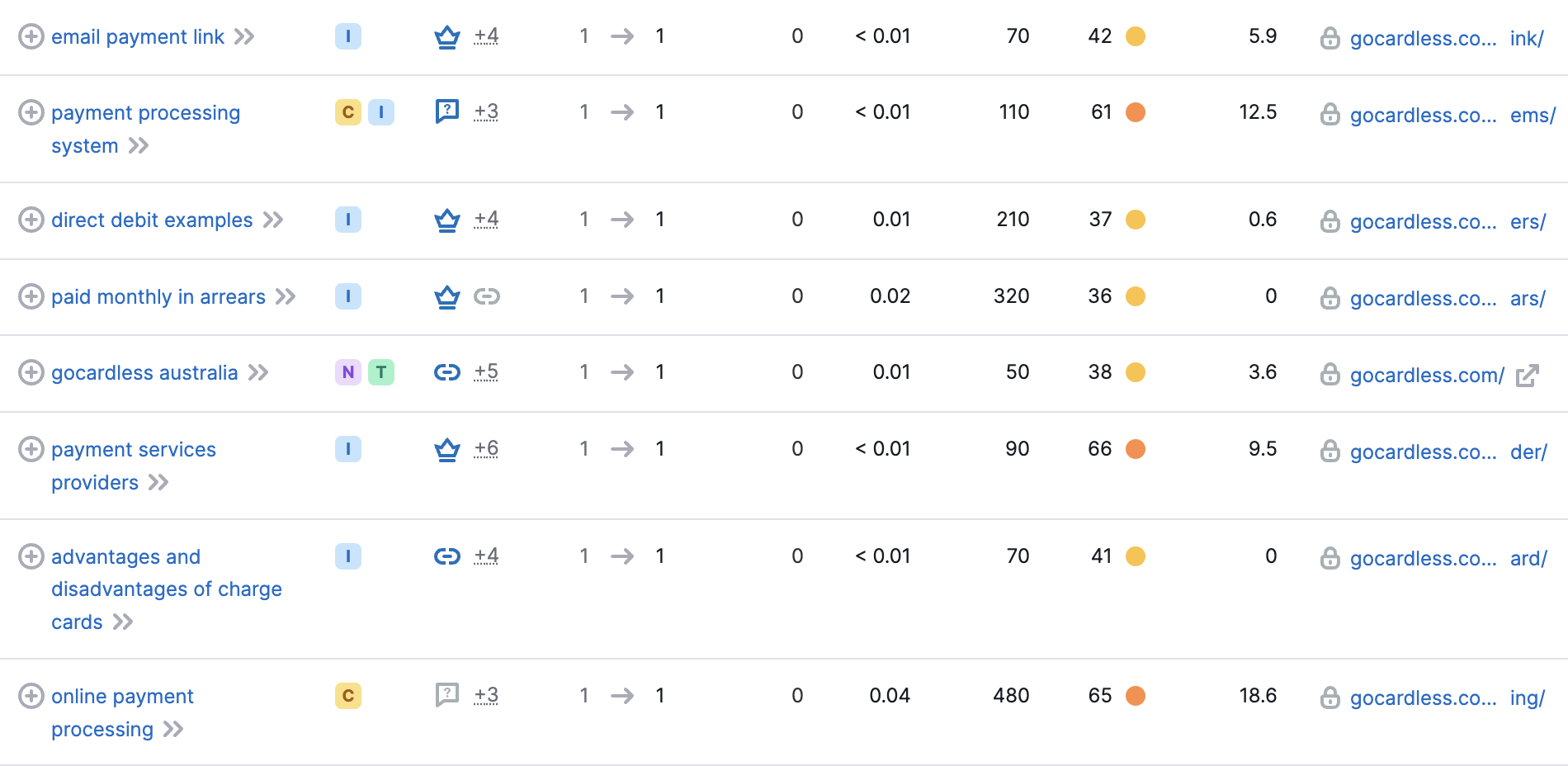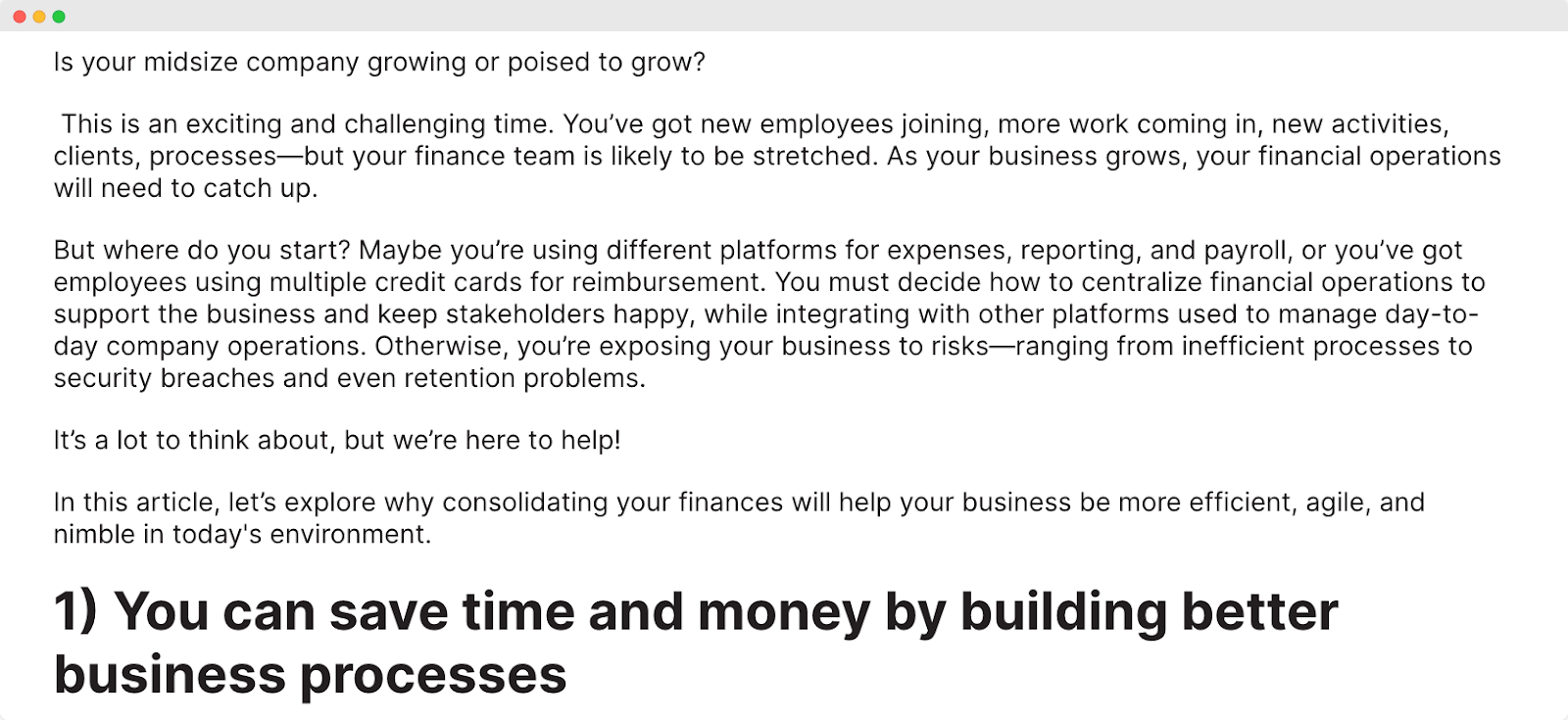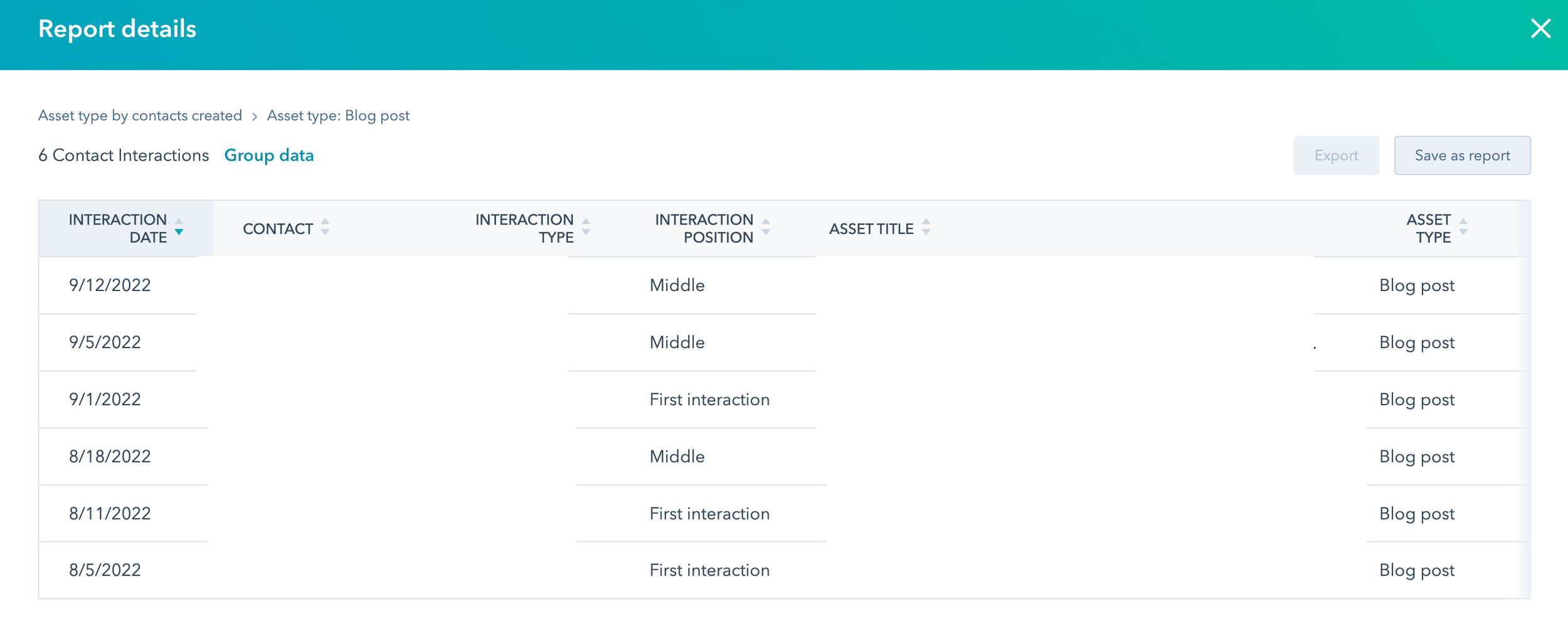One of the common content objections in the financial B2B and enterprise space is that SEO and content cannot bring in qualified leads.
Some marketers believe the website blog is for brand awareness, product or company announcements. They might say it’s for marketing and nurturing leads, not for converting people. They might believe that product managers, CTOs, and other C Suite don’t use Google to do research and that therefore it’s not useful to create SEO content that targets them.
In this article, we want to show that based on our experience, this doesn’t seem to be strictly true.
We’ve been working with B2B fintech companies where a customer is worth hundreds of thousands, and have successfully been able to bring in sales-qualified leads.
What’s even more surprising is that the type of content that brought these leads was the least counterintuitive type of content. Essentially, it’s the kind of content that marketing leaders and salespeople would usually stay away from.
In this article, we’ll break down common objections we hear in the B2B enterprise space, and how our process has brought in qualified leads for multiple clients.
Common objections to creating SEO content for enterprise
“Product managers and CTOs don’t use Google to do research”
One of the main objections we hear is that “our target market doesn’t use Google”. To quote British astrophysicist Martin Rees, this is a clear case of “absence of evidence does not equal evidence of absence”. People who say this usually have not tried content with SEO before and are essentially basing this on an assumption.
On the other hand, we have tried and executed it: we have created SEO, Bottom of the Funnel content that targets enterprise customers, and what we find is the opposite. With our type of content, we have been able to bring in leads with titles such as Business Analyst, Product Manager and Founder.
It’s important to be clear, however, that we are not trying to rank for generic terms like “payment method” or “ direct debits”. We’re ranking for ultra-specific keywords that are bottom of the funnel and indicate purchase intent.
For example, instead of ranking for “direct debit”, we’d want to rank for “direct debit API”.
“We need to rank for key phrases like ‘payment method’ and ‘credit card’”
Ranking on Google is one challenge: converting the reader into a customer is a separate one. Many SEO agencies and freelancers will help you with the first one, but you need a different type of agency or consultant to help you with the second challenge.
The reason that most agencies don’t focus on performance is that in order to help with conversions, you need to work with someone who will take the time to learn about your product, target market and company. They also need to understand your target market well enough that they would know what they want to read and what is likely to convert them into a customer.
A lot of fintech companies targeting enterprise focus on ranking for large keywords like “payment methods”, “bank to bank payments” or “payment processing”.
For example, GoCardless has written a lot of content focusing on these keywords and is ranking for some very specific, and some would say, valuable keywords:

But if you click through the articles, you’ll see that they begin like this:

Now, that might be fine if you are targeting small businesses that know nothing about payments (which GoCardless does). But if you’re targeting product managers and CTOs, they won’t be very impressed with an article that begins by defining what a payment service provider does.
Which is why when a company like Brex – which targets CFOs (they fired all their SMB customers), writes an article like this, they are entirely missing the mark:

If you work at a B2B fintech company that targets people who are experts in their field, does it really make sense to rank for “payment method” or “payment processing”?
There might be cases where it does. But we’ve found better success targeting very highly targeted keywords with very low search volume (20 - 50 per month). Since there are incredibly targeted, the competition is low. That means you often find yourself in position one incredibly quickly (sometimes immediately).
“Only gated content and whitepapers bring in leads”
When working at the B2B and enterprise level, many marketers believe that leads come from white papers and gated content.
This approach does work in certain instances, but we find there are a few flaws with this approach:
- Every year, fewer people are willing to input their email for content, since there is so much information freely available online.
- People who give you their email for content aren’t necessarily interested in your product – they might just sign up because they’re interested in your content, which means they may never be interested in buying.
- It might take forever to turn them into a SQL.
Instead, we’ve found better success with creating content that targets incredibly specific keywords. So specific, that the people searching it have to be in your target market. Someone searching “faster payments API” is looking for something very specific and is likely to be interested in your product, if that’s what you offer.
The keyword might only get 20 searches per month, but if 10 of these people read your blog and then send an enquiry and become a qualified lead, that can turn into customers that are worth hundreds of thousands.
Would you rather rank for “direct debit” and have thousands of pageviews but 5 leads a year, or rank for “direct debit API” and get tens of pageviews and get 5 leads a month?
This is a screenshot of one of our clients’ Hubspot. The blog posts are incredibly targeted and aren’t ranking for head terms, and yet they still bring in and influence leads:

“My topic is too niche for someone to write about”
Another objection we hear in more technical fields like payments and crypto, is the product or niche is too specific for a freelancer or agency to successfully write about.
While this is true to a certain degree, we have found success in writing about technical topics. See these articles below:
- Top payment orchestration platforms (and what to look out for)
- PayTo: How to prepare and plan for it (with use cases and examples!)
- Split payments API: How Zai's API can help you set up a custom payment workflow
These are relatively technical, and we didn’t have the knowledge first-hand. Instead, we set up calls with salespeople and experts on the client’s team and were able to ask specific questions that allowed us to create content that is more advanced.
Although there are some topics that might require hiring an in-house writer or someone with specific knowledge of the industry, we find that it’s worth trying interview-based content with a very good writer who knows which questions to ask. Sure, you might not be able to write technical documentation and go as deep as you’d like, but your content is likely to be a lot better than what competitors are writing – and that’s often good enough.
Our argument essentially is: you’re better off writing a slightly advanced/technical article based on an interview with an expert, than a thought leadership style article that is based on desk research and doesn’t tell the reader anything new. It’s a good middle ground that won’t require hiring an in-house writer or spending a lot of money on a freelance technical writer.
You can learn more about how we do this in this article: Why You Should Create Content Based on Interviews With Experts
How to create blog content that brings in Sales Qualified Leads
How do we do it? How do we create blog content that brings in sales-qualified leads worth hundreds of thousands?
We follow the same four pillar framework that we use for other clients, and it goes like this:
1.Create blog content focused on conversions
There is a time and place for guides on “types of payment methods” and “what is a direct debit” – but if you are focused on generating leads and customers, it’s better to focus on Bottom of the Funnel. That’s what we do: we focus on creating content that focuses on very targeted keywords that only our target market would be searching for.
Instead of producing a piece of gated content or a whitepaper, we would write it as a blog post that ranks for ultra-specific keywords. These are not just any keywords: these are keyphrases that focus on prospects who are very close to buying, and who are at the bottom of the funnel.
In order to understand what these prospects were searching for, we would start off by sitting down with salespeople and asking them questions such as:
- Who are your best customers?
- Who are the easiest people to close?
- Top use cases?
- Think of the last prospect you closed, what challenges were they trying to solve?
You can find more of the questions we ask here: How to Do Research for Bottom of the Funnel Content Marketing
Our strategy focuses on understanding pain points of customers and what triggers them to go to Google and search for a solution. We also integrate the big five questions that customers ask:
- Alternatives to. (e.g. alternative to Paypal)
- Comparison articles (e.g. Xero vs Freeagent)
- Best of articles (e.g. best accounting software for freelancers)
- Pricing pages (e.g. how many fees do [incumbent competitor] charge?)
- Use case blogs (e.g. how do I open a bank account as a contractor?)
Interestingly, the one article that brings in the most SQLs for one of our B2B clients is a “top X solutions” article, where we do talk about competitors and aim to be transparent – which is not a piece of content a B2B marketer would usually do.
2. Create content written for the level of your audience
Since we’re targeting people who are about to convert and are usually product managers, CTOs and founders, they will be experts on their topic. That means you can’t get away with writing content that starts with “what is a payment method”. You need to write advanced content that is for their level of expertise.
If we were to rank for something like “direct debit API” we would therefore add all the information we thought readers would want: diagrams, a clear explanation of how it works and examples and use cases.
You can clearly see how we did this in this article we wrote for a client: Split payments API: How Zai's API can help you set up a custom payment workflow
Since we’re not experts in certain payment topics ourselves, how do we write about this? The answer is…
3. Base your content on interviews with salespeople/experts
As part of our engagement with clients, all our articles are based on interviews with salespeople or experts on their team.
If your company targets enterprise customers, you have a huge advantage: your salespeople are often experts on the topic. When it comes to marketing and content, your salespeople have a goldmine of information, and content involves extracting that information and sharing it via content.
We were able to write articles on APIs and other complex topics because we based each piece of content on an interview with a salesperson.
Not only that, but the content we write is genuinely useful to the reader because it comes from a place of expertise. If one your missions as a company is to help spread financial education, creating expert-based content is key to adding value and therefore helping you advance that mission.
For example, one of our clients’ mission, Jeeves, is to help startup founders understand financing and pick the best financing option for their company.
One of their key leaders is a former investor at a16z, and knows a lot about helping startups with fundraising.
We wanted to write an article on how to help startups extend their runway. We could have based it on desk research and essentially combined all the other generic advice found on Google, like:

Or:

But instead, we were able to do an interview with Matt, and create a comprehensive, in-depth, unique and genuinely useful article for founders, with insights like these:

The result? An article that is a lot more comprehensive and helpful. And we were able to rank in the top positions quite quickly.
Matt kindly gave us a shoutout in this tweet:
6/ Special thanks to @mintcstudios in helping us rank on the 1st page of Google so quickly so that we can share our learnings and insights with as many founders and small businesses as possible 🙏
— Matthieu Hafemeister (@matt_haf) August 31, 2022
4. Track blog conversions
Finally, this is all for nothing if you cannot prove to the leadership team that the content you create is bringing in the right number of leads and there is an effective ROI.
If you’re targeting enterprise, you’re likely using Hubspot, Salesforce or some sort of enterprise CRM. The huge benefit of using Hubspot is that you can track exactly what a lead has read and the influence of content on them.
With Hubspot, you can set up a specific campaign for your Bottom of the Funnel blog content and then track its performance over time. This is a little better than Google Analytics, which tends to be less accurate.
With enterprise, you only need a handful of leads per month to make content worth it, which is why it makes even more sense to invest in this type of content.
Knowing these numbers helps us direct our content strategy, and also helps communicate to the leadership team what is and isn’t working.
What’s different for enterprise-level content?
There are a few things that are different we’ve noticed when companies targetting enterprise that we thought might be worth mentioning.
You only need a handful of leads to prove the ROI
What is so powerful about enterprise is if your customers are worth £100k+ per year, you don’t need as many leads per month or year to break even from costs.
No enterprise tool out there allows you to be as targeted as SEO does when it comes to identifying people at the bottom of the funnel. It also means that incredibly targeted content that focuses on pain points can go a lot further and make a much bigger impact than if your customers are only worth £150 per year.
In these cases, we argue that content makes even more sense since you can target your ideal customer in a way that no other marketing channel can.
Competition is low
Most companies targeting enterprise are still focused on white papers and gated content, which means very few people are creating content focusing on bottom of the funnel keywords. In fact, if you type “direct debit api”, you’ll see that the results are mostly either documentation or product pages.
Essentially, the bar is very low and we see that there is a huge opportunity here for companies to use content SEO to get SQLs.
Not only that, but B2B topics are often more complex than usual, which means target companies are even more likely to read up on the topic and do their research – which leads to Google.
If you enable direct debit APIs and are ranking in first position for that, you’re likely to bring in high quality leads.
Buy-in from leadership is VERY important
In the enterprise world, salespeople are your key people.
However, salespeople are incredibly busy and are on calls all day, which can make it harder to ask them to get on more calls to do interviews for content.
A few ways to overcome this is:
- Set up weekly calls on the diary so they know when the call is scheduled and can plan ahead
- Work with, not against them: if they prefer writing rather than speaking, do that. If they prefer chatting at a certain time of day, work with that.
- Get the C-Suite involved. They are the ones who can get salespeople to commit to calls.
- Explain the why: explain to everyone around you why you’re producing this type of content and why this benefits them in the long run. Once salespeople see that the content they’re helping you with brings in customers, they’re a lot more likely to cooperate.
Once salespeople see the value, they often are happier to collaborate.
Companies targeting enterprise are afraid to write about competitors
In the enterprise world, people are afraid of talking about competitors and are wary of being too transparent about their product.
But the fact is that B2B is still B2 Human. And as humans, there are five topics that we care the most about, no matter if we buy for ourselves or on behalf of our company:
- Pricing
- Problems
- Comparisons
- Alternatives
- Use cases
The point is, your target market will compare you to your competitors, will ask about pricing and will want to know the problems that might arise, whether you like it or not.
We’ve seen a lot of success with creating content that ranks for alternatives and comparisons articles for B2C and SMB B2B clients. It turns out that it also works with enterprise B2B as well.
It might feel strange to write an article like “Salesforce vs Competitor vs Your Product” – but we can assure you that your target market is searching for it. We know because we wrote a similar style article for a B2B client, and it is currently the article that is bringing in the most qualified leads.
We believe that there is a large opportunity to create content that talks about competitors, or about the topics that people are nervous about talking about (e.g. compliance, market conditions, etc).
There is no denying that you will be met with some resistance at first: salespeople will ask why you’re talking about someone else’s product, and product marketers might feel it doesn’t make sense. But feel free to send them this article, and we’re happy to chat with people on the team to explain the thinking behind this.
We’d also argue: what the worst that could happen? People will always be comparing your product to competitors (and if they don’t know who your competitors are, they will find out more quickly than the time it took you to finish reading this sentence). We argue it makes sense to try it. Once you have one article bringing in leads, it’ll be easier to write more. Why not give it a go?
In this article we’ve addressed some of the objections we hear about content and SEO bringing in SQLs for B2B enterprise, and we hope that we’ve been able to explain why these assumptions are not always right.
In fact, we believe there is a huge opportunity here for enterprise companies to write incredibly targeted content. We’re incredibly grateful to be able to work with B2B companies that are open to trying new types of content and are working with us to help create this type of content. The end result is that we can bring in SQLs and create content that is a lot more aligned with their goals.
If you think your company could benefit from this type of content, feel free to reach out and we can discuss if our type of engagement might be a good fit for you.











